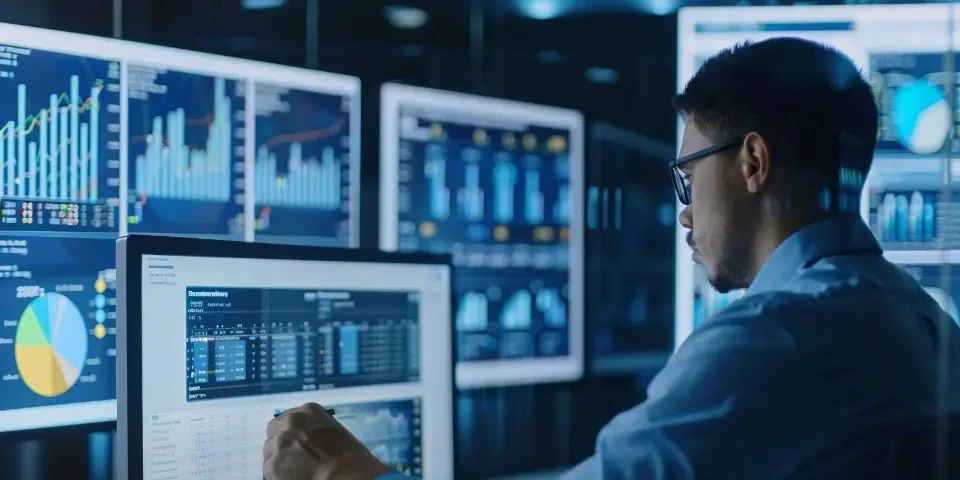Exploring the Impact of AI on Financial Markets
Artificial Intelligence (AI) has transformed various industries, and the financial market is no exception. The integration of AI technologies has significantly impacted how financial markets operate, bringing both advantages and challenges. In this article, we will explore the impact of AI on financial markets from various angles:
1. Automated Trading
AI-powered algorithms enable automated trading, where computers execute trades based on predefined criteria and market insights. This improves execution speed and accuracy, minimizing human error and emotion-driven decisions.

However, the increasing reliance on AI-driven trading raises concerns about market stability and the potential for algorithmic errors causing significant disruptions.
2. Risk Assessment and Fraud Detection
AI can analyze vast amounts of financial data and identify patterns that humans might miss. This enables more accurate risk assessment models, helping investors make informed decisions and mitigating fraudulent activities, such as money laundering and insider trading.
Nevertheless, AI-driven risk assessment algorithms may be susceptible to biases present in the training data, potentially leading to discriminatory outcomes.
3. Customer Service
Financial institutions use AI-powered chatbots and virtual assistants to provide 24/7 customer support. These AI systems can understand natural language, offer personalized recommendations, and resolve simple queries, improving overall customer experience.
Yet, some customers may prefer human interactions over AI, raising concerns about the potential loss of personal touch in financial services.
4. Market Analysis
AI algorithms can analyze large volumes of financial data in real-time, identifying trends and predicting market movements. This assists traders in making data-driven investment decisions and provides valuable insights for portfolio management.
Nevertheless, reliance on AI analysis might create herd behavior as many investors may rely on similar algorithms, exacerbating market volatility and potentially leading to a lack of diversity in investment strategies.
5. Algorithmic Trading Regulation
The rapid rise of AI in financial markets has prompted regulators to establish guidelines for algorithmic trading. These regulations aim to ensure fairness, transparency, and stability in the market, reducing the risk of market manipulation or system failures.
However, striking the right balance between regulation and innovation remains a challenge, as excessive regulation might hinder market efficiency and innovation.
6. Data Privacy and Security
With AI's reliance on vast amounts of data, protecting sensitive financial information becomes crucial. Financial firms must ensure robust data privacy and security measures to prevent unauthorized access and potential breaches.
Yet, the increasing sophistication of AI algorithms creates concerns about potential misuse of personal data and the implications for privacy rights.
7. Market Predictability
AI's ability to process large datasets and identify complex patterns has the potential to improve market predictability. This can enable more accurate forecasting, reduce investment risk, and foster smarter trading strategies.
However, the complexity of financial markets makes complete predictability challenging. Unforeseen events, such as geopolitical shifts, can create unpredictable market dynamics, making AI predictions less reliable in these situations.
8. Job Displacement
As AI automates certain financial tasks, it raises concerns about job displacement within the industry. While AI can enhance productivity and efficiency, it may also lead to a reduction in certain roles, requiring workers to upskill or transition into alternative job positions.
However, AI also creates opportunities for new roles within the industry, such as AI model developers and AI ethics specialists.
Common Questions:
Q1: Can AI completely replace human traders?
A1: AI can automate certain trading tasks, but complete replacement of human traders is unlikely as some decisions require human intuition and adaptability.
Q2: How does AI address biases in financial decision-making?
A2: AI algorithms can be designed to identify and mitigate inherent biases present in data, helping to ensure fair and unbiased decision-making.
Q3: Are AI-powered financial systems immune to cyber attacks?
A3: While AI systems can enhance security measures, they are not entirely immune to cyber attacks. Continuous efforts are needed to stay ahead of evolving cyber threats.
References:
1. Smith, J. (2020). The Impact of Artificial Intelligence on Financial Markets. Investopedia. [Link]
2. Chui, M., Manyika, J., & Miremadi, M. (2016). Where machines could replace humans—and where they can’t (yet). McKinsey & Company. [Link]
3. Tshilidzi Marwala. (2018). Artificial Intelligence and Financial Markets: Global Perspectives. Springer.
Explore your companion in WeMate